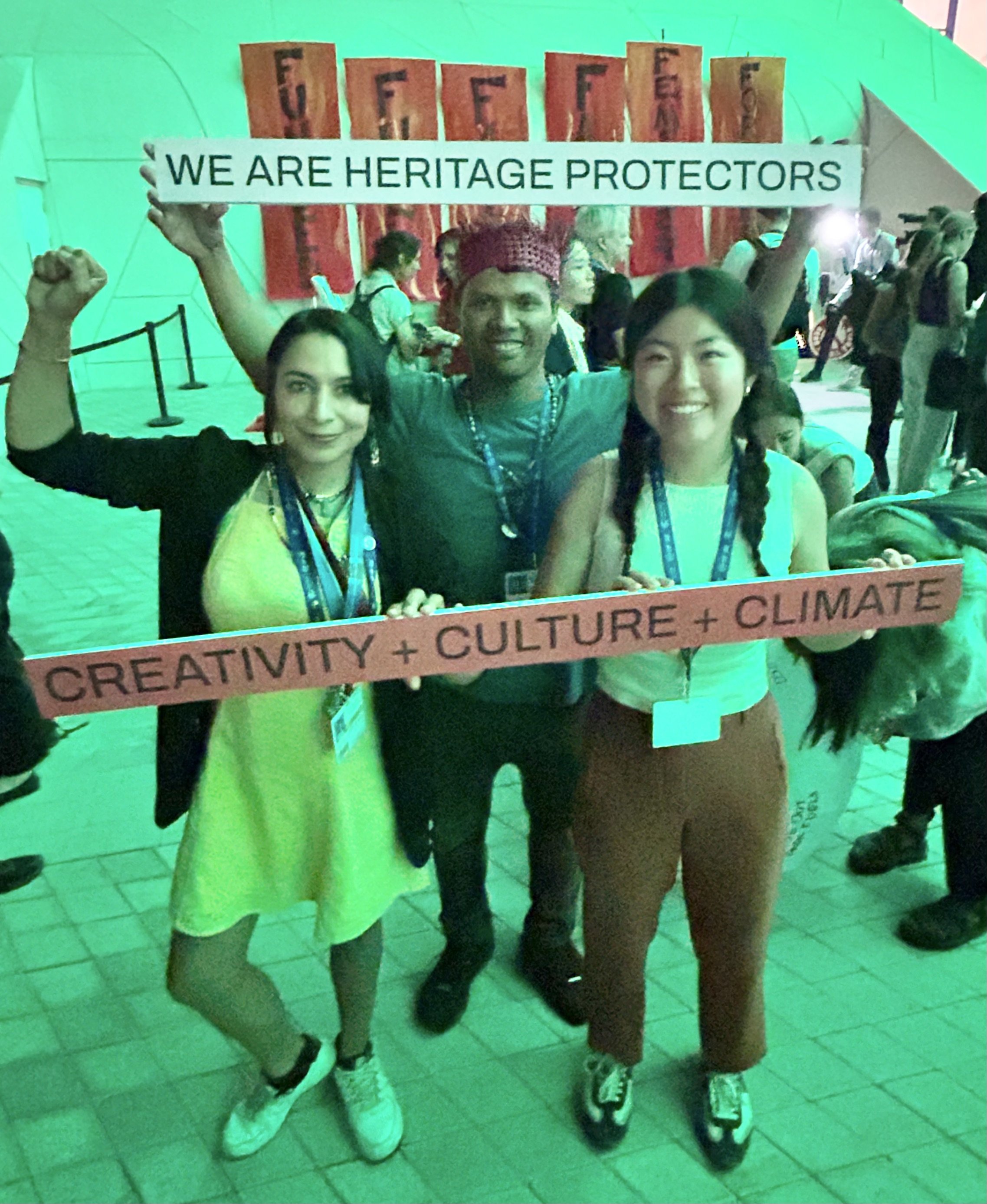
COP28 Outcomes
Current climate policy and planning often overlooks the power of culture-based climate action. The result is a global climate response that struggles to fulfil the ambitions of the Paris Agreement. However COP28, which took place in Dubai in November 2023, delivered the most significant outcome for culture in COP history with unprecedented political commitment to engaging with cultural heritage, the arts, and creative industries.
Unfortunately these outcomes came too late to influence COP28’s premier decision, the Global Stocktake (GST). While the GST does include a historic decision to call out fossil fuels, its silence on the socio-cultural enablers of climate action leaves a ‘GST Culture Gap’ that will undermine its ability to effectively influence future climate action if not corrected.
We have broken down key updates relating to culture and heritage from COP28 below, but you can also read further detail in the Climate Heritage Network's Full Reaction to COP28 Outcomes.
What happened at COP28?
Group of Friends
Over 30 nations joined the Group of Friends of Culture-Based Climate Action, launched at the first ever multilateral High-Level Ministerial Dialogue on Culture-based Climate Action which took place at COP28 on 8 December 2023. The Ministerial resulted in the unanimous adoption of the visionary Emirates Declaration on Culture-Based Climate Action.
Entertainment and Culture for Climate Change
The Entertainment and Culture for Climate Change (ECCA) alliance launched a new visual arts pillar, the Art Charter for Climate Action, during the 60th Venice Biennale international art exhibition. ART 2030, the Gallery Climate Coalition, the International Committee for Museums and Collections of Modern Art (CIMAM), and Julie’s Bicycle serve as the Art Charter’s founding steering committee.
ECCA is convened by UN Climate Change in partnership with stakeholders in arts, film, music, television, and other relevant sectors as they accelerate the green transition of the creative industries and inspire climate action beyond the sector through artistic expression and innovation. ECCA now aims to build upon the excellent foundational work of the film and television convening committee and is also developing a pilot music initiative.
A founding signatory of the Call to Action, COP28 marked the establishment of the inaugural E+C Pavilion.
The Pavilion was a pioneering space dedicated to showcasing the power of art, music, storytelling, and cultural heritage in addressing the climate crisis, and also hosted the Global Call to Action’s launch event.
You can read their impact report MIND THE CULTURE GAP: How Culture Heritage, Entertainment + Storytelling Are Igniting Climate Action and watch the accompanying webinar.
Entertainment + Culture Pavilion
Group photo at the Entertainment + Culture PavilionCOP28 Policy updates
Our guide to key decisions taken by national governments at COP28 relevant to culture and heritage:
The UNFCCC’s Global Goal on Adaptation was groundbreaking this year in its inclusion of cultural heritage and traditional knowledge across efforts to set overarching objective, qualitative, and time-bound dimensional and thematic adaptation targets. However, there were weak provisions on adaptation finance and means of implementation. Groundbreaking work on this topic has already been done by the Race to Resilience: Culture.
The historic decision setting up the Loss and Damage Fund makes clear that funding of Non-economic Loss (which includes culture and heritage) will be a core component of the Fund’s work.
The decision to institutionalise the COP Presidency Youth Climate Champion parallels work done at COP28 and globally to support youth-led care for culture as climate action.
The Global Stocktake demonstrated a failure to address the historical and cultural systems that support the fossil fuel economy as well as the socio-cultural enablers of climate action.
Other COP28 updates: These include a new local government-oriented Coalition for High Ambition Multilevel Partnership was launched and the COP28 Joint Statement on Climate, Nature and People.
COP28 Youth delegates driving culture and heritage climate action’s messages included:
Championing the idea that traditional knowledge and ways of living in harmony with nature need to be incorporated into COP climate change agendas
Recognising the importance of climate justice by highlighting Indigenous Peoples and marginalised groups and their challenges
How climate change policy should focus on addressing language barriers
Recognising the power of natural heritage in tackling climate and biodiversity crises
Young Cultural Advocates at COP28
Members of the support team for a locally-led climate vulnerability risk assessment for the Rice Terraces of the Cordileras World Heritage property held in Banaue, Philippines in 2023.Thanks to the support of ALIPH





